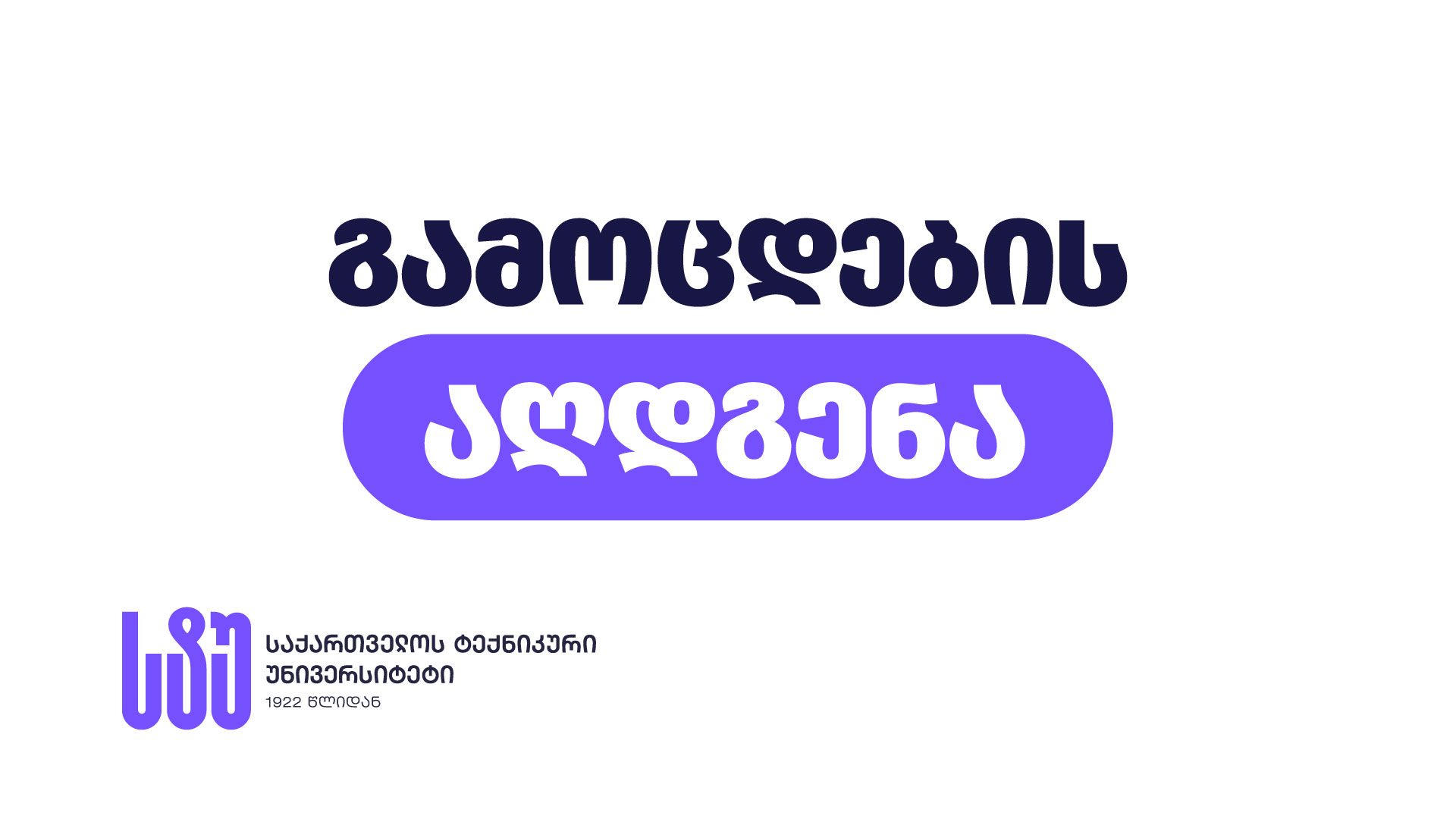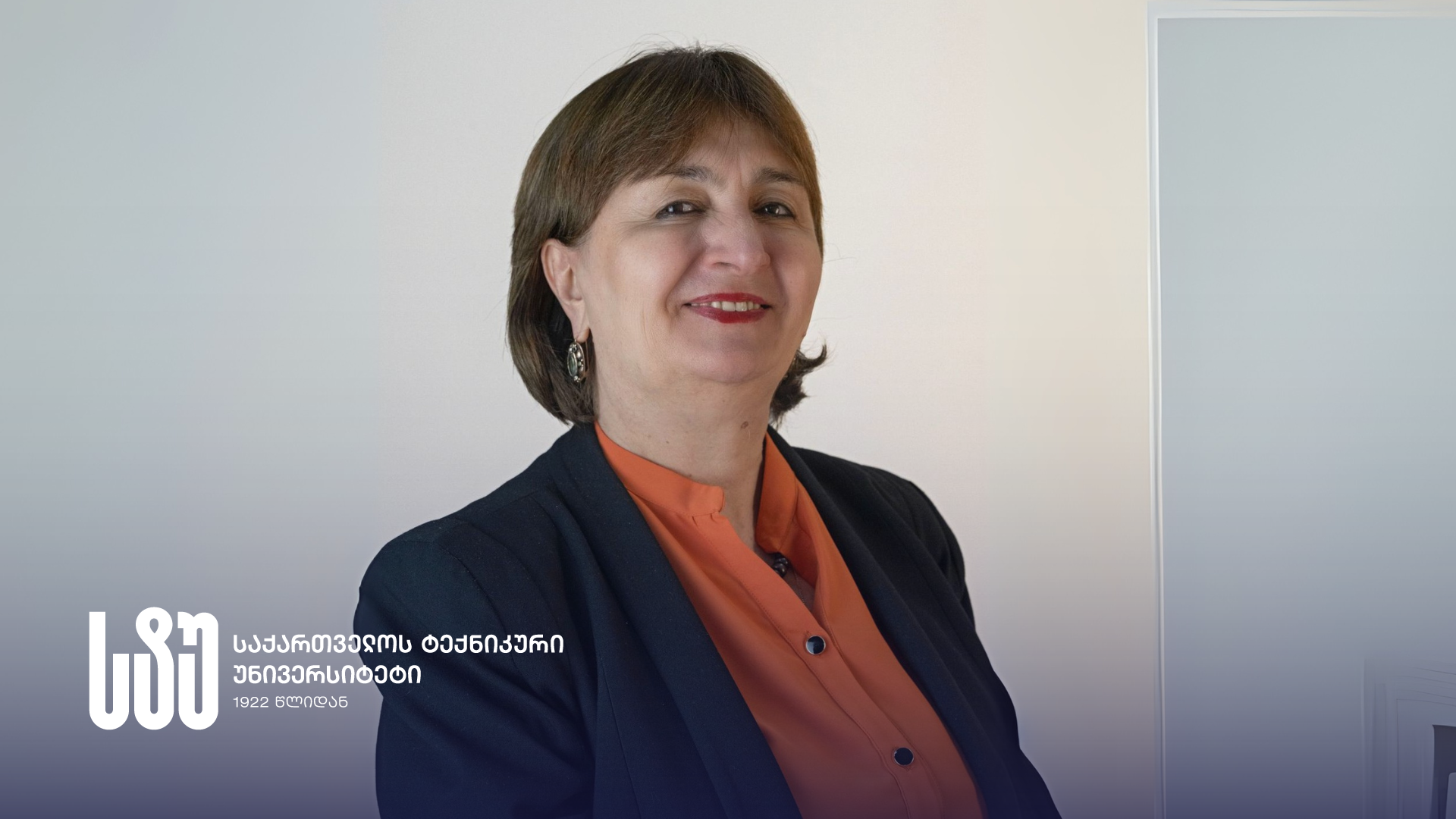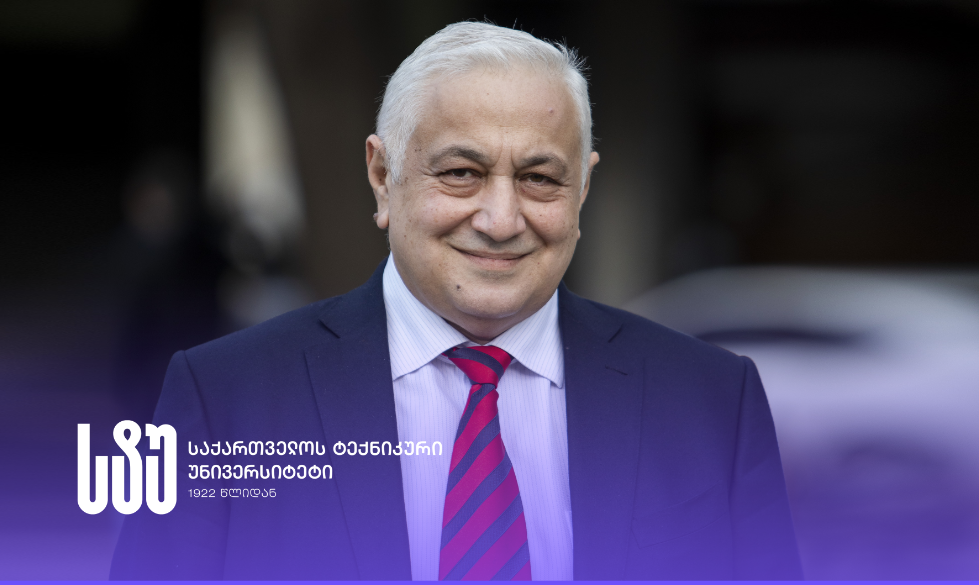“Collaboration With CERN, One of the Largest Research Centers, Has Brought Many Positive Results for the Georgian Technical University,” Says Rector, Academician David Gurgenidze
11-03-2025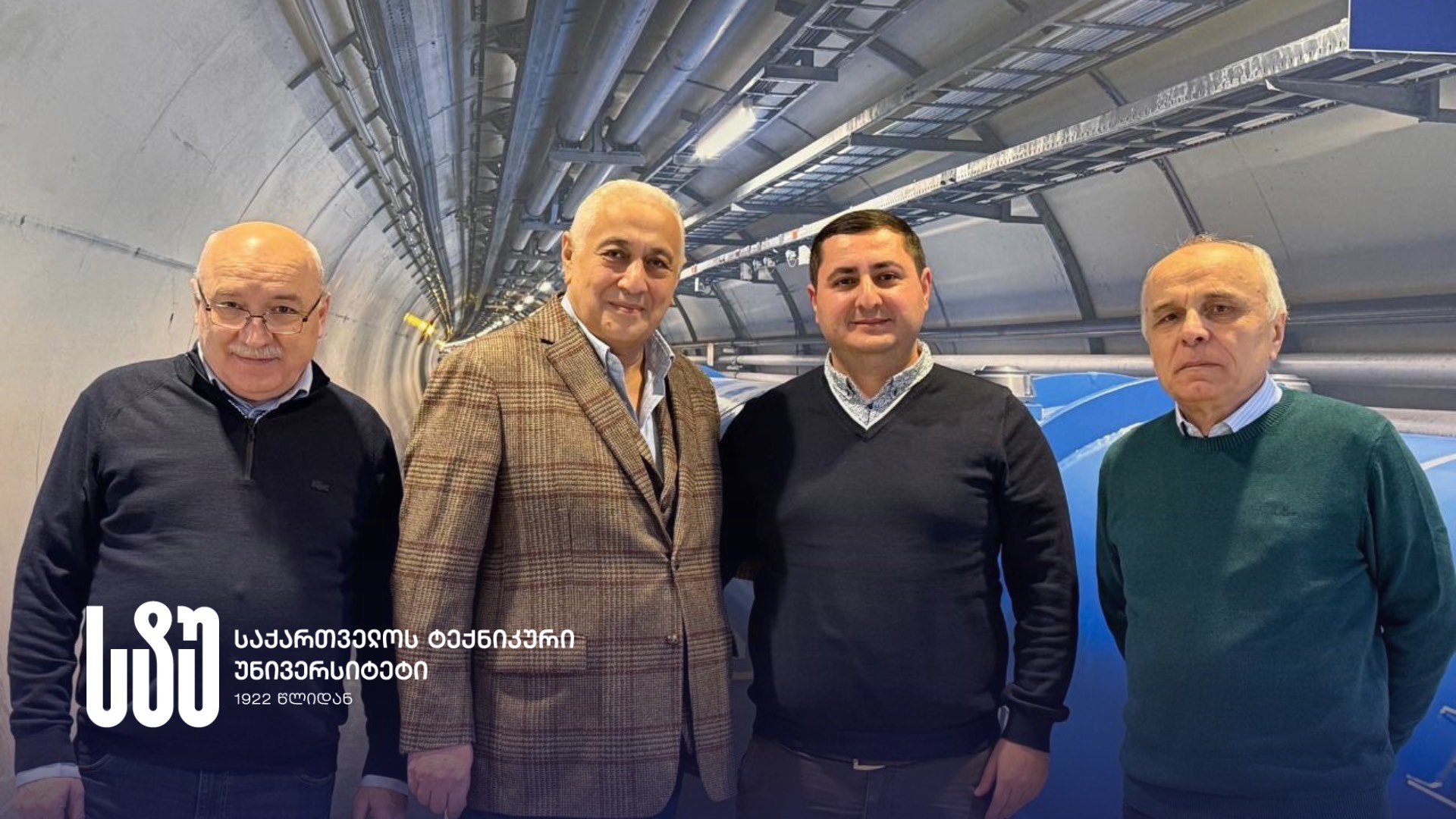
The Rector of the Georgian Technical University, an Associate Member of CERN, Academician David Gurgenidze, the Director of the GTU Institute of Quantum Physics and Engineering Technologies, the representative of the Georgian government at CERN, as well as the head of the Georgian group at the CMS experiment, Zviad Tsamalaidze, were on a working visit to CERN in Geneva within the framework of the new Memorandum of Understanding between the Georgian Technical University and the European Organization for Nuclear Research (CERN).
The scientific collaboration between the Georgian Technical University and CERN dates back two decades. New memorandums, which are of paramount importance in the Georgian scientific space and envisage a much deeper integration of GTU scientists and researchers into global research processes, were signed in October last year.
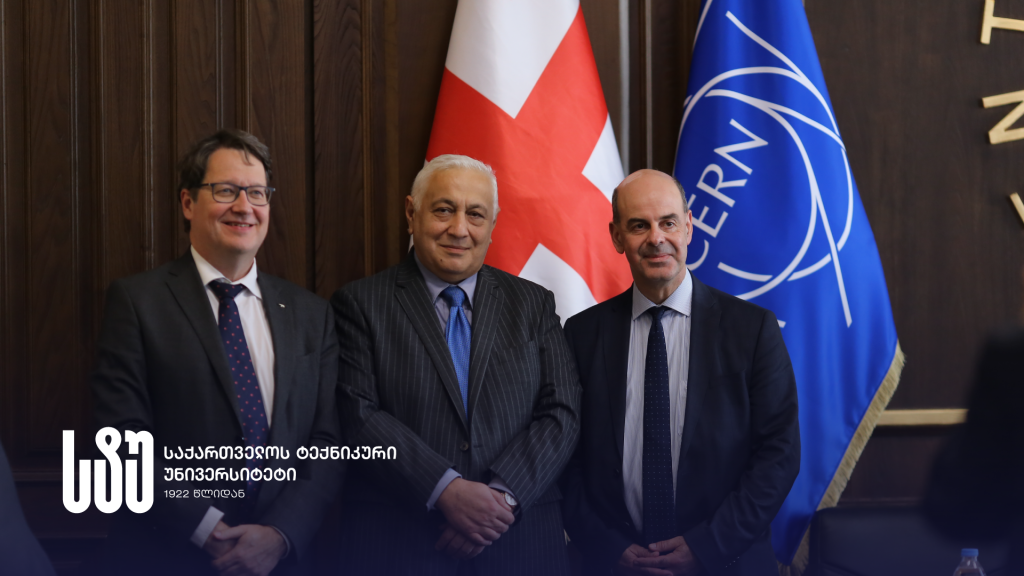
“The first memorandum of understanding concerns the renewal of the CMS experiment currently underway at CERN within the HL-LHC phase and the continued participation of our university researchers in it, while the second one envisages the active involvement of the university’s scientists and engineers in the implementation of the future cyclic collider, FCC, at CERN. The participation of the research potential of the Georgian Technical University in the future scientific activities of CERN, which is implemented with the support of the Government of Georgia, the Ministry of Education, Science, and Youth, is of paramount importance both for the university and its researchers, young scientists and students, as well as for CERN,” says Academician David Gurgenidze.
As the rector notes, during the last working visit to CERN, which ended at the end of February, the parties reconciled all the important issues covered by the new memorandums.
“I would like to draw special attention to the second document. We can boldly call it the “Memorandum of the Century”, which was signed for the first time in the scientific space of the region with the Georgian Technical University. It is about the creation of a 100-kilometer-long cyclic collider of the future and the implementation of its physical program. These works will begin immediately after the completion of the physical program of the Large Hadron Collider, LHC. Currently, in parallel with the implementation of the LHC, important works are underway, including the unification of countries in the FCC collaboration and the creation of working groups - we discussed all these issues during the working visit. It is noteworthy that scientific and research works are conducted for the FCC in the direction of the accelerator and the latest type of detectors. A group of scientists and engineers from the Institute of Quantum Physics and Engineering Technologies of our university, led by the Director of the Institute and the representative of the Georgian government at CERN, Professor Zviad Tsamalaidze, are involved in these works. They are currently working on the Technical Design Report creation - TDR for the FCC program,” says David Gurgenidze.
According to him, the working visit was also fruitful, they discussed the issues of updating one of the largest CMS experiments underway at CERN within the HL-LHC phase, in which a group of scientists from the university is also involved.
“The update of the CMS experiment for the HL-LHC includes not only the update of the currently operating detectors but also the replacement of some of them with new ones. A new type of high-granulation calorimeter creation - HGCAL - is a high priority in the update program. It should be noted that this is a universal calorimeter, the like of which has not been created in science to date, and we are pleased that engineers and scientists from the Georgian Technical University will contribute in this direction.
It is important that over the years, the European Organization for Nuclear Research has duly assessed the intellectual capabilities of our university scientists and expressed its confidence in us, which is also strengthened by friendly relations. It was a complete surprise for me when I was elected as an associate member of the CMS experiment last year - for my contribution to deepening scientific relations with the European Organization for Nuclear Research and the CMS collaboration, as well as for my personal organizational and scientific achievements. On behalf of the university, I would like to thank the government of our country, Prime Minister Irakli Kobakhidze, and the Ministry of Education, Science, and Youth for their support in integrating Georgian universities into the international educational and scientific space because all such efforts will help the young generation of Georgian scientists achieve success in the worldwide arena,” the rector states.
During his visit to CERN, Academician David Gurgenidze got acquainted with the processes of creating, testing, and integrating components of the upgraded detectors, and assessed their performance and reliability. In addition, he consulted with Georgian scientists involved in the CMS experiment on key aspects of detector engineering, optimization strategies, and planning future research directions.
The rector says that the university scientists are participating in CERN advanced experimental physics projects, especially in the RPC and HGCAL groups of the CMS muon system. This year, they completed the creation of 80 state-of-the-art iRPC cameras, the necessary cooling system, and new-generation electronics, which was an important part of the CMS experiment modernization program. The final testing of these cameras is underway on the cosmic muon facility, which was built in CERN’s #904 laboratory by the university physicists - Yuri Baghaturia and Irakli Lomidze.
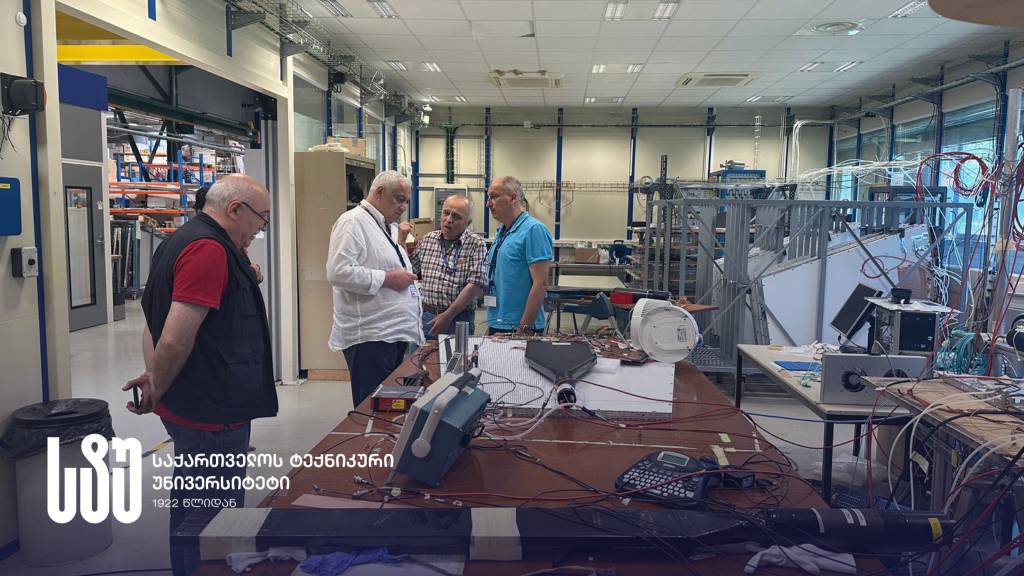
As David Gurgenidze notes, the working visit to the European Organization for Nuclear Research was preceded by a conference - “Past, Present, and Future Cooperation - Georgia-CERN”, which was held at the Georgian Technical University on October 17-18 of the previous year, under the auspices of events dedicated to the 70th anniversary of CERN, with the support of the Shota Rustaveli Georgian National Science Foundation (Grant: CG - 24 - 234).
The newly elected CERN Council President, Professor Costas Fontas, and a delegation of famous scientists of the organization participated in the conference. According to the rector, this is a confirmation of CERN’s partnership attitude and emphasizes the desire to deepen collaboration with the Georgian university and its scientists.
“Our university was among the member countries and member universities of the CERN/CMC collaboration that a delegation from the European Organization for Nuclear Research visited on a business visit as part of the anniversary. The conference was held with the support of the Rustaveli Foundation and was attended by the newly elected President of the CERN Council, Professor Costas Fontas, who was visiting Georgia for the first time, and renowned scientists - Andrzej Kharkiewicz, Deputy Resource Manager of the CMS Collaboration, David Barney, CMS/HGCal Coordinator, Salvatore Buontempo, Head of the CMS/RPC Subdetector, Luciano Musa, Coordinator of the CERN 70th Anniversary Events, Head of the Non-Member States Committee, Tiziano Camporesi, CMS Leader, Chiara Marriott, CMS Lead Scientist, Kirsty Aspola, CMS Resource Coordinator.
The conference was also attended by a well-known Japanese scientist who was on a working visit to our university, the manager of one of the world’s largest COMET experiments, conducted at the Japanese Proton Accelerator Research Complex J-PARC under the auspices of the Japanese High Energy Accelerator Research Organization KEK, and the advisor to the Japanese Ministry of Education, Science, Culture, and Sports, Professor Satoshi Mihara. This is a recognition of the scientific potential of the Georgian Technical University. It is noteworthy that the President of the CERN Council, Professor Fontas, and CERN scientists met with the Minister of Education, Science and Youth of Georgia, Aleksandre Tsuladze, the President of the Georgian National Academy of Sciences, Academician Roin Metreveli, and Georgian academicians. This meeting, in which we also participated, was held at the Academy of Sciences.
Over the years, collaboration with one of the largest research centers in the world has brought many positive results to the Georgian Technical University. Our success is also confirmed by the fact that the emblem of our university is placed on the CMS maps along with the emblems of the world’s leading universities and organizations. A group of scientists from our Institute of Quantum Physics and Engineering Technologies - led by Professor Zviad Tsamalaidze, and consisting of Yuri Baghaturia, Davit Lomidze, Otar Kemularia, Irakli Lomidze, Sandro Melkadze, Giorgi Adamov, David Chokheli, and others - perform the most difficult work in the CMS experiment underway at the Large Hadron Collider”, - says David Gurgenidze.
According to the Rector, it is significant for the Georgian Technical University to see how fruitful the future scientific collaboration process with CERN and other major scientific centers in the world will be, as successfully implemented international projects and participation in global scientific experiments significantly increase the opportunities for the successful integration of the Technical University, its scientists, and young researchers into the international scientific space.
The scientific collaboration between the Georgian Technical University and CERN dates back two decades. New memorandums, which are of paramount importance in the Georgian scientific space and envisage a much deeper integration of GTU scientists and researchers into global research processes, were signed in October last year.

“The first memorandum of understanding concerns the renewal of the CMS experiment currently underway at CERN within the HL-LHC phase and the continued participation of our university researchers in it, while the second one envisages the active involvement of the university’s scientists and engineers in the implementation of the future cyclic collider, FCC, at CERN. The participation of the research potential of the Georgian Technical University in the future scientific activities of CERN, which is implemented with the support of the Government of Georgia, the Ministry of Education, Science, and Youth, is of paramount importance both for the university and its researchers, young scientists and students, as well as for CERN,” says Academician David Gurgenidze.
As the rector notes, during the last working visit to CERN, which ended at the end of February, the parties reconciled all the important issues covered by the new memorandums.
“I would like to draw special attention to the second document. We can boldly call it the “Memorandum of the Century”, which was signed for the first time in the scientific space of the region with the Georgian Technical University. It is about the creation of a 100-kilometer-long cyclic collider of the future and the implementation of its physical program. These works will begin immediately after the completion of the physical program of the Large Hadron Collider, LHC. Currently, in parallel with the implementation of the LHC, important works are underway, including the unification of countries in the FCC collaboration and the creation of working groups - we discussed all these issues during the working visit. It is noteworthy that scientific and research works are conducted for the FCC in the direction of the accelerator and the latest type of detectors. A group of scientists and engineers from the Institute of Quantum Physics and Engineering Technologies of our university, led by the Director of the Institute and the representative of the Georgian government at CERN, Professor Zviad Tsamalaidze, are involved in these works. They are currently working on the Technical Design Report creation - TDR for the FCC program,” says David Gurgenidze.
According to him, the working visit was also fruitful, they discussed the issues of updating one of the largest CMS experiments underway at CERN within the HL-LHC phase, in which a group of scientists from the university is also involved.
“The update of the CMS experiment for the HL-LHC includes not only the update of the currently operating detectors but also the replacement of some of them with new ones. A new type of high-granulation calorimeter creation - HGCAL - is a high priority in the update program. It should be noted that this is a universal calorimeter, the like of which has not been created in science to date, and we are pleased that engineers and scientists from the Georgian Technical University will contribute in this direction.
It is important that over the years, the European Organization for Nuclear Research has duly assessed the intellectual capabilities of our university scientists and expressed its confidence in us, which is also strengthened by friendly relations. It was a complete surprise for me when I was elected as an associate member of the CMS experiment last year - for my contribution to deepening scientific relations with the European Organization for Nuclear Research and the CMS collaboration, as well as for my personal organizational and scientific achievements. On behalf of the university, I would like to thank the government of our country, Prime Minister Irakli Kobakhidze, and the Ministry of Education, Science, and Youth for their support in integrating Georgian universities into the international educational and scientific space because all such efforts will help the young generation of Georgian scientists achieve success in the worldwide arena,” the rector states.
During his visit to CERN, Academician David Gurgenidze got acquainted with the processes of creating, testing, and integrating components of the upgraded detectors, and assessed their performance and reliability. In addition, he consulted with Georgian scientists involved in the CMS experiment on key aspects of detector engineering, optimization strategies, and planning future research directions.
The rector says that the university scientists are participating in CERN advanced experimental physics projects, especially in the RPC and HGCAL groups of the CMS muon system. This year, they completed the creation of 80 state-of-the-art iRPC cameras, the necessary cooling system, and new-generation electronics, which was an important part of the CMS experiment modernization program. The final testing of these cameras is underway on the cosmic muon facility, which was built in CERN’s #904 laboratory by the university physicists - Yuri Baghaturia and Irakli Lomidze.

As David Gurgenidze notes, the working visit to the European Organization for Nuclear Research was preceded by a conference - “Past, Present, and Future Cooperation - Georgia-CERN”, which was held at the Georgian Technical University on October 17-18 of the previous year, under the auspices of events dedicated to the 70th anniversary of CERN, with the support of the Shota Rustaveli Georgian National Science Foundation (Grant: CG - 24 - 234).
The newly elected CERN Council President, Professor Costas Fontas, and a delegation of famous scientists of the organization participated in the conference. According to the rector, this is a confirmation of CERN’s partnership attitude and emphasizes the desire to deepen collaboration with the Georgian university and its scientists.
“Our university was among the member countries and member universities of the CERN/CMC collaboration that a delegation from the European Organization for Nuclear Research visited on a business visit as part of the anniversary. The conference was held with the support of the Rustaveli Foundation and was attended by the newly elected President of the CERN Council, Professor Costas Fontas, who was visiting Georgia for the first time, and renowned scientists - Andrzej Kharkiewicz, Deputy Resource Manager of the CMS Collaboration, David Barney, CMS/HGCal Coordinator, Salvatore Buontempo, Head of the CMS/RPC Subdetector, Luciano Musa, Coordinator of the CERN 70th Anniversary Events, Head of the Non-Member States Committee, Tiziano Camporesi, CMS Leader, Chiara Marriott, CMS Lead Scientist, Kirsty Aspola, CMS Resource Coordinator.
The conference was also attended by a well-known Japanese scientist who was on a working visit to our university, the manager of one of the world’s largest COMET experiments, conducted at the Japanese Proton Accelerator Research Complex J-PARC under the auspices of the Japanese High Energy Accelerator Research Organization KEK, and the advisor to the Japanese Ministry of Education, Science, Culture, and Sports, Professor Satoshi Mihara. This is a recognition of the scientific potential of the Georgian Technical University. It is noteworthy that the President of the CERN Council, Professor Fontas, and CERN scientists met with the Minister of Education, Science and Youth of Georgia, Aleksandre Tsuladze, the President of the Georgian National Academy of Sciences, Academician Roin Metreveli, and Georgian academicians. This meeting, in which we also participated, was held at the Academy of Sciences.
Over the years, collaboration with one of the largest research centers in the world has brought many positive results to the Georgian Technical University. Our success is also confirmed by the fact that the emblem of our university is placed on the CMS maps along with the emblems of the world’s leading universities and organizations. A group of scientists from our Institute of Quantum Physics and Engineering Technologies - led by Professor Zviad Tsamalaidze, and consisting of Yuri Baghaturia, Davit Lomidze, Otar Kemularia, Irakli Lomidze, Sandro Melkadze, Giorgi Adamov, David Chokheli, and others - perform the most difficult work in the CMS experiment underway at the Large Hadron Collider”, - says David Gurgenidze.
According to the Rector, it is significant for the Georgian Technical University to see how fruitful the future scientific collaboration process with CERN and other major scientific centers in the world will be, as successfully implemented international projects and participation in global scientific experiments significantly increase the opportunities for the successful integration of the Technical University, its scientists, and young researchers into the international scientific space.
